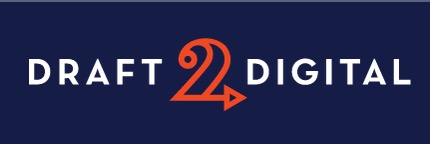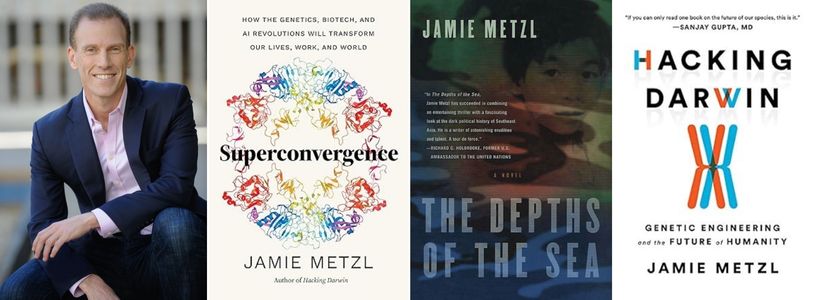Writing The Future, And Being More Human In An Age of AI With Jamie Metzl
Description
How can you write science-based fiction without info-dumping your research? How can you use AI tools in a creative way, while still focusing on a human-first approach? Why is adapting to the fast pace of change so difficult and how can we make the most of this time? Jamie Metzl talks about Superconvergence and more.
In the intro, How to avoid author scams [Written Word Media]; Spotify vs Audible audiobook strategy [The New Publishing Standard]; Thoughts on Author Nation and why constraints are important in your author life [Self-Publishing with ALLi];
Alchemical History And Beautiful Architecture: Prague with Lisa M Lilly on my Books and Travel Podcast.
Today's show is sponsored by Draft2Digital, self-publishing with support, where you can get free formatting, free distribution to multiple stores, and a host of other benefits. Just go to www.draft2digital.com to get started.
This show is also supported by my Patrons. Join my Community at Patreon.com/thecreativepenn
Jamie Metzl is a technology futurist, professional speaker, entrepreneur, and the author of sci-fi thrillers and futurist nonfiction books, including the revised and updated edition of Superconvergence: How the Genetics, Biotech, and AI Revolutions Will Transform Our Lives, Work, and World.
You can listen above or on your favorite podcast app or read the notes and links below. Here are the highlights and the full transcript is below.
Show Notes
- How personal history shaped Jamie's fiction writing
- Writing science-based fiction without info-dumping
- The super convergence of three revolutions (genetics, biotech, AI) and why we need to understand them holistically
- Using fiction to explore the human side of genetic engineering, life extension, and robotics
- Collaborating with GPT-5 as a named co-author
- How to be a first-rate human rather than a second-rate machine
You can find Jamie at JamieMetzl.com.
Transcript of interview with Jamie Metzl
Jo: Jamie Metzl is a technology futurist, professional speaker, entrepreneur, and the author of sci-fi thrillers and futurist nonfiction books, including the revised and updated edition of Superconvergence: How the Genetics, Biotech, and AI Revolutions Will Transform Our Lives, Work, and World. So welcome, Jamie.
Jamie: Thank you so much, Jo. Very happy to be here with you.
Jo: There is so much we could talk about, but let's start with you telling us a bit more about you and how you got into writing.
From History PhD to First Novel
Jamie: Well, I think like a lot of writers, I didn't know I was a writer. I was just a kid who loved writing.
Actually, just last week I was going through a bunch of boxes from my parents' house and I found my autobiography, which I wrote when I was nine years old. So I've been writing my whole life and loving it. It was always something that was very important to me.
When I finished my DPhil, my PhD at Oxford, and my dissertation came out, it just got scooped up by Macmillan in like two minutes. And I thought, “God, that was easy.”
That got me started thinking about writing books. I wanted to write a novel based on the same historical period – my PhD was in Southeast Asian history – and I wanted to write a historical novel set in the same period as my dissertation, because I felt like the dissertation had missed the human element of the story I was telling, which was related to the Cambodian genocide and its aftermath.
So I wrote what became my first novel, and I thought, “Wow, now I'm a writer.” I thought, “All right, I've already published one book. I'm gonna get this other book out into the world.” And then I ran into the brick wall of: it's really hard to be a writer. It's almost easier to write something than to get it published.
I had to learn a ton, and it took nine years from when I started writing that first novel, The Depths of the Sea, to when it finally came out. But it was such a positive experience, especially to have something so personal to me as that story. I'd lived in Cambodia for two years, I’d worked on the Thai-Cambodian border, and I'm the child of a Holocaust survivor. So there was a whole lot that was very emotional for me.
That set a pattern for the rest of my life as a writer, at least where, in my nonfiction books, I'm thinking about whatever the issues are that are most important to me. Whether it was that historical book, which was my first book, or Hacking Darwin on the future of human genetic engineering, which was my last book, or Superconvergence, which, as you mentioned in the intro, is my current book.
But in every one of those stories, the human element is so deep and so profound. You can get at some of that in nonfiction, but I've also loved exploring those issues in deeper ways in my fiction.
So in my more recent novels, Genesis Code and Eternal Sonata, I've looked at the human side of the story of genetic engineering and human life extension. And now my agent has just submitted my new novel, Virtuoso, about the intersection of AI, robotics, and classical music.
With all of this, who knows what's the real difference between fiction and nonfiction? We're all humans trying to figure things out on many different levels.
Shifting from History to Future Tech
Jo: I knew that you were a polymath, someone who's interested in so many things, but the music angle with robotics and AI is fascinating.
I do just want to ask you, because I was also at Oxford – what college were you at?
Jamie: I was in St. Antony's.
Jo: I was at Mansfield, so we were in that slightly smaller, less famous college group, if people don't know.
Jamie: You know, but we're small but proud.
Jo: Exactly. That's fantastic.
You mentioned that you were on the historical side of things at the beginning and now you've moved into technology and also science, because this book Superconvergence has a lot of science. So how did you go from history and the past into science and the future?
Biology and Seeing the Future Coming
Jamie: It's a great question. I'll start at the end and then back up.
A few years ago I was speaking at Lawrence Livermore National Laboratory, which is one of the big scientific labs here in the United States. I was a guest of the director and I was speaking to their 300 top scientists.
I said to them, “I'm here to speak with you about the future of biology at the invitation of your director, and I'm really excited. But if you hear something wrong, please raise your hand and let me know, because I'm entirely self-taught. The last biology course I took was in 11th grade of high school in Kansas City.”
Of course I wouldn't say that if I didn't have a lot of confidence in my process. But in many ways I'm self-taught in the sciences. As you know, Jo, and as all of your listeners know, the foundation of everything is curiosity and then a disciplined process for learning.
Even our greatest super-specialists in the world now – whatever their background – the world is changing so fast that if anyone says, “Oh, I have a PhD in physics/chemistry/biology from 30 years ago,” the exact topic they learned 30 years ago is less significant than their process for continuous learning.
More specifically, in the 1990s I was working on the National Security Council for President Clinton, which is the president’s foreign policy staff. My then boss and now close friend, Richard Clarke – who became famous as the guy who had tragically predicted 9/11 – used to say that the key to efficacy in Washington and in life is to try to solve problems that other people can't see.
For me, almost 30 years ago, I felt to my bones that this intersection of what we now call AI and the nascent genetics revo







